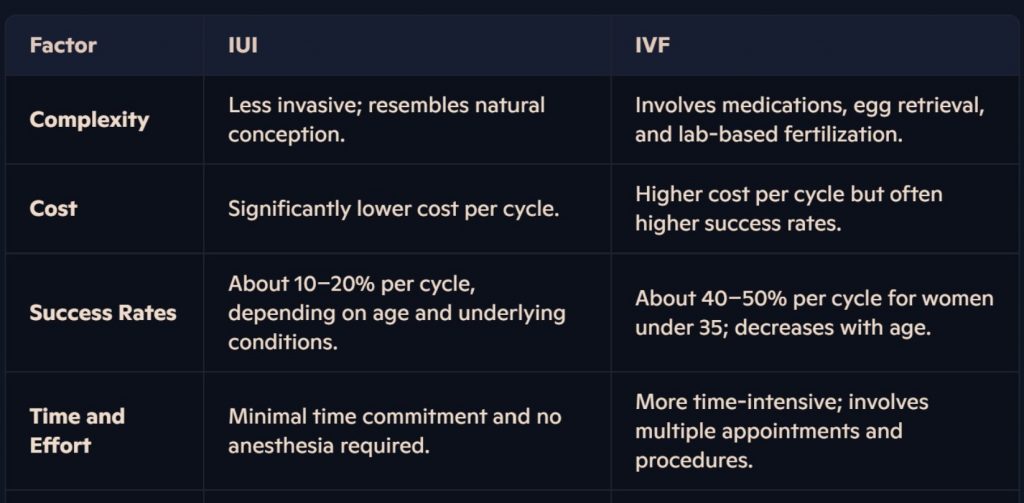
When you’re navigating the world of fertility treatments, it’s easy to feel overwhelmed by the options. Two of the most common treatments are Intrauterine Insemination (IUI) and In Vitro Fertilization (IVF). While both can help you achieve your dream of parenthood, they’re distinct procedures with different benefits, challenges, and success rates. So, how do you decide which is right for you? Let’s dive in and break it down in simple, clear terms.
What is IUI?
Intrauterine Insemination (IUI) is often referred to as a “low-tech” fertility treatment. It’s relatively simple and non-invasive compared to IVF. Here’s how it works:
- Sperm is collected, washed, and concentrated to improve its quality.
- Using a small catheter, the sperm is placed directly into the uterus around the time of ovulation, increasing the chances of fertilization.
Who Might Benefit from IUI? IUI is often the first step in fertility treatment and is recommended for individuals or couples facing:
- Unexplained infertility.
- Mild male-factor infertility (e.g., low sperm count or motility).
- Cervical mucus issues that may hinder sperm movement.
What is IVF?
In Vitro Fertilization (IVF) is a more advanced fertility treatment. It involves stimulating the ovaries to produce multiple eggs, retrieving them, and fertilizing them with sperm in a lab to create embryos. The resulting embryos are then transferred to the uterus.
Who Might Benefit from IVF? IVF is often recommended for individuals or couples with:
- Blocked or damaged fallopian tubes.
- Severe male-factor infertility.
- Endometriosis-related infertility.
- Repeated failed attempts with IUI or other treatments.
- Those preserving fertility through embryo freezing.
Comparing IUI and IVF: Key Factors
Here’s how IUI and IVF stack up in key areas:

Making the Right Choice
The decision between IUI and IVF depends on several factors:
- Underlying Fertility Issues: Your doctor will assess the root cause of infertility to recommend the most effective option.
- Budget: IUI is generally more affordable, making it a starting point for many.
- Timeline: If time is a critical factor (e.g., age or medical considerations), IVF may offer faster results.
- Emotional Readiness: IVF requires a greater emotional and physical commitment.
Can You Try IUI First?
For many, starting with IUI is a logical choice—it’s less invasive and less costly. However, if IUI cycles are unsuccessful, IVF may be the next step. A 2022 study in Fertility and Sterility found that moving to IVF after 3–4 failed IUI cycles can improve outcomes.
The Hopeful Horizon
Whichever path you choose, fertility treatments are constantly improving. Innovations like genetic testing, embryo freezing, and personalized hormone protocols are making both IUI and IVF more effective.
Final Thoughts
The decision between IUI and IVF is deeply personal, and there’s no “one-size-fits-all” answer. By working closely with a fertility specialist, you can create a plan that’s tailored to your needs, preferences, and goals.

